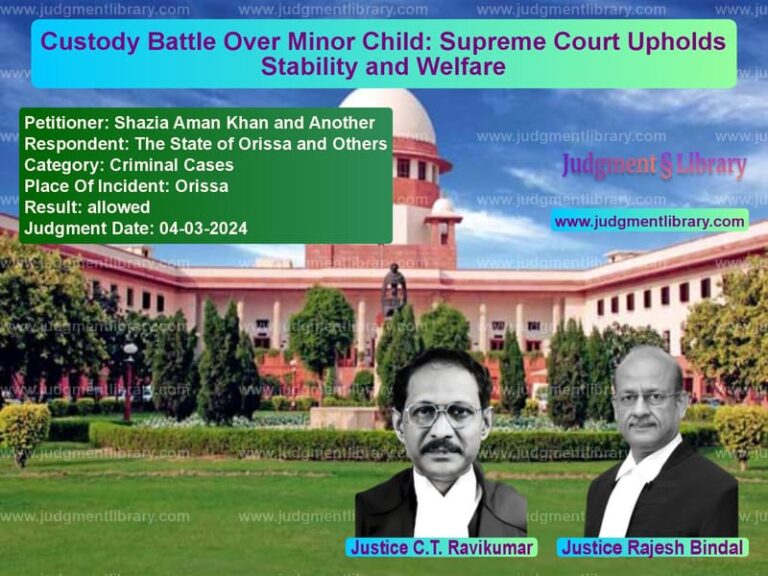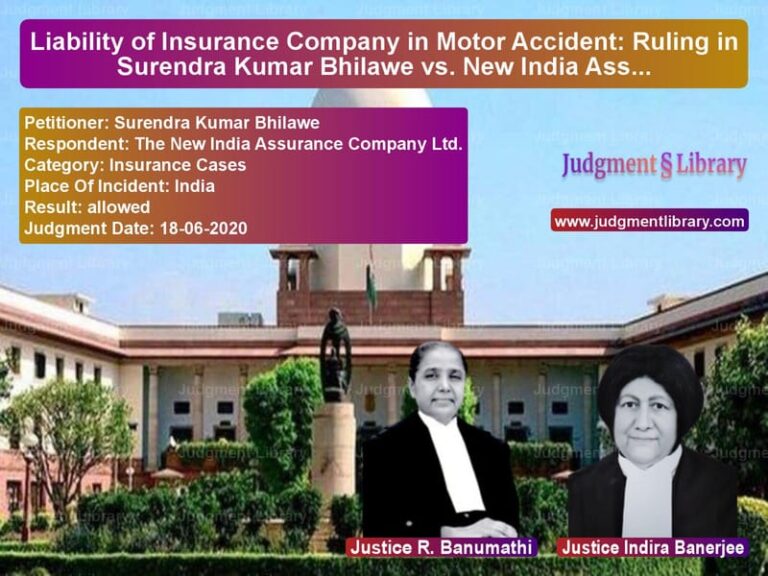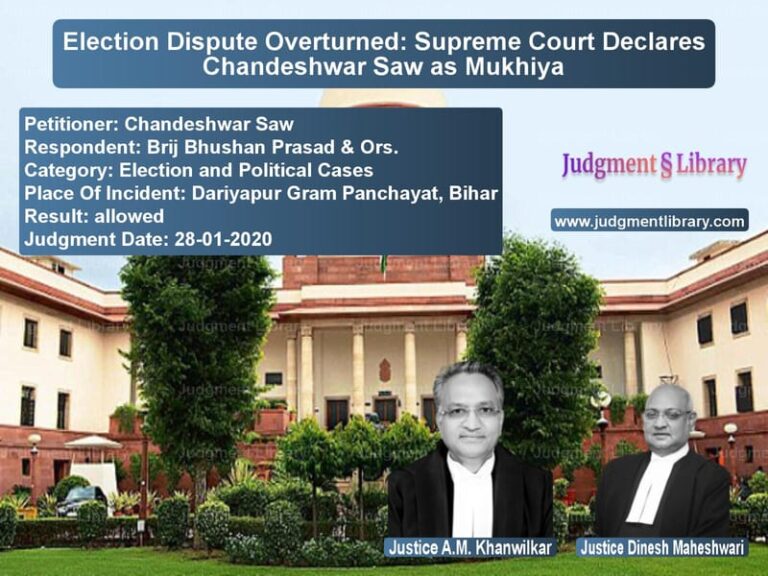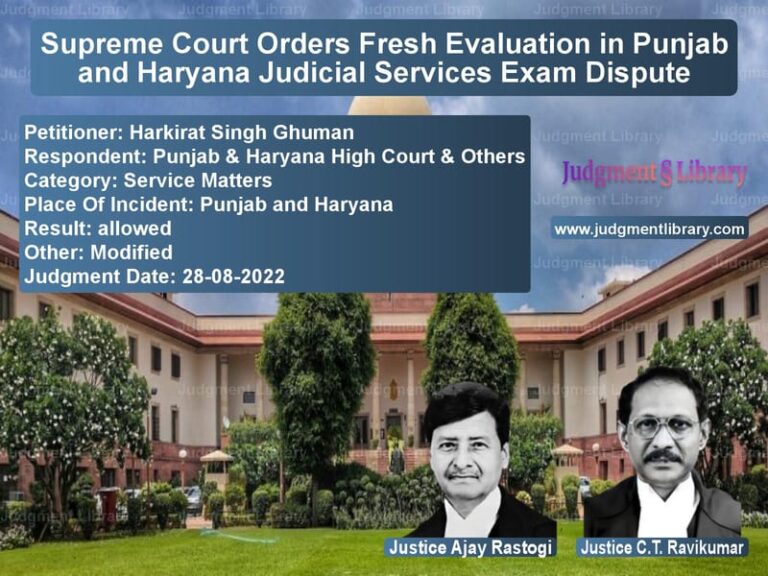Supreme Court Rules on Arbitrator Eligibility: TRF Ltd vs. Energo Engineering
The Supreme Court of India, in the case of TRF Ltd. v. Energo Engineering Projects Ltd., examined a crucial issue related to the eligibility of arbitrators under the Arbitration and Conciliation Act, 1996, as amended in 2015. The key question before the Court was whether an individual who is statutorily disqualified from being appointed as an arbitrator can still nominate another person to act as the arbitrator.
Background of the Case
The case arose from a purchase order issued by Energo Engineering Projects Ltd. to TRF Ltd. for the design, manufacturing, and supply of bulk material handling equipment. A dispute arose between the parties, leading to arbitration proceedings.
The arbitration clause in the contract provided that disputes between the parties should be referred to the sole arbitration of the Managing Director of the Buyer or his nominee. However, with the amendment of the Arbitration and Conciliation Act in 2015, Section 12(5) introduced a statutory disqualification for certain individuals from being appointed as arbitrators if their relationship with the parties created a potential conflict of interest.
Key Issues Before the Court
- Whether the Managing Director of the Buyer, having become ineligible to act as an arbitrator due to Section 12(5), could still nominate another arbitrator.
- Whether an arbitration agreement providing for an ineligible arbitrator to nominate a replacement was legally valid.
- Whether an appointment made under such a clause would be considered valid under the Arbitration Act.
Arguments of the Petitioner (TRF Ltd.)
The petitioners, represented by senior counsel Mr. Sundaram, contended:
- Since the Managing Director was ineligible to act as an arbitrator, he was also ineligible to nominate another person as an arbitrator.
- Allowing an ineligible arbitrator to make a nomination would undermine the intent of the 2015 amendments to the Arbitration Act.
- The principle of “Qui facit per alium facit per se” (What one does through another is done by oneself) applies, meaning that an ineligible arbitrator nominating another person was equivalent to acting as an arbitrator himself.
- The decision in Chairman, Indore Vikas Pradhikaran v. Pure Industrial Coke & Chemicals Ltd. supported the argument that a disqualified authority cannot exercise a power indirectly that it cannot exercise directly.
Arguments of the Respondent (Energo Engineering Projects Ltd.)
The respondents, represented by senior counsel Mr. Chidambaram, argued:
- Even if the Managing Director was disqualified from being an arbitrator, this did not prevent him from nominating an arbitrator.
- The Arbitration Act only disqualified individuals from acting as arbitrators, not from nominating arbitrators.
- Any challenge to the appointment of an arbitrator should be raised before the arbitral tribunal and not in an application under Section 11 of the Act.
- The petitioners had not shown how the appointed arbitrator’s independence and impartiality were affected.
Supreme Court’s Analysis and Judgment
The Supreme Court, led by Dipak Misra, A.M. Khanwilkar, and M. Shantanagoudar, ruled in favor of the petitioner, holding:
- The Managing Director was ineligible to act as an arbitrator due to the provisions of Section 12(5) of the Act.
- Once an individual becomes ineligible to be appointed as an arbitrator, he also loses the right to nominate another person as an arbitrator.
- Allowing a disqualified person to nominate an arbitrator would be contrary to the intent of the 2015 amendments, which aimed to ensure fairness and impartiality in arbitration proceedings.
- The principle of “Qui facit per alium facit per se” applied in this case, meaning that an act done through another person is equivalent to doing it oneself.
- The appointment of an arbitrator made under such a clause was therefore invalid.
Conclusion
This landmark decision reinforced the principle of independence and impartiality in arbitration. The ruling ensures that a person who is disqualified from acting as an arbitrator cannot circumvent the law by appointing a nominee. This decision strengthens the integrity of arbitration proceedings in India and aligns with international best practices.
Don’t miss out on the full details! Download the complete judgment in PDF format below and gain valuable insights instantly!
Download Judgment: TRF Ltd. vs Energo Engineering P Supreme Court of India Judgment Dated 03-07-2017.pdf
Direct Downlaod Judgment: Direct downlaod this Judgment
See all petitions in Arbitration Awards
See all petitions in Dispute Resolution Mechanisms
See all petitions in Arbitration Act
See all petitions in Judgment by Dipak Misra
See all petitions in Judgment by A M Khanwilkar
See all petitions in Judgment by Mohan M. Shantanagoudar
See all petitions in allowed
See all petitions in supreme court of India judgments July 2017
See all petitions in 2017 judgments
See all posts in Arbitration and Alternate Dispute Resolution Category
See all allowed petitions in Arbitration and Alternate Dispute Resolution Category
See all Dismissed petitions in Arbitration and Alternate Dispute Resolution Category
See all partially allowed petitions in Arbitration and Alternate Dispute Resolution Category






